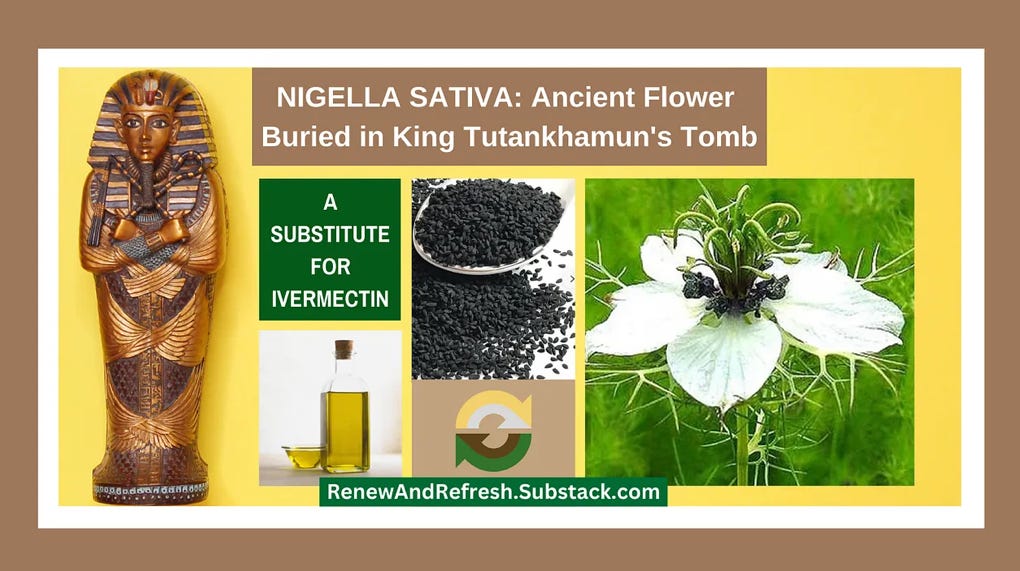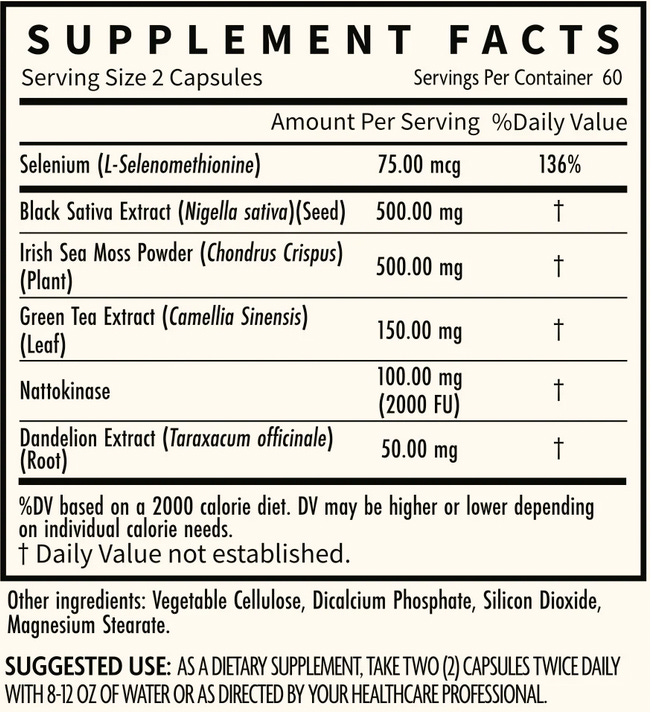If You Don't Have Ivermectin, Use the Ancient Egyptian Flowering Plant Nigella Sativa, also Known as Black Seed or Black Cumin
Native to Southwest Asia and the Middle East it was used for thousands of years dating back to ancient Egypt. It was found in the tomb of King Tutankhamun
Nigella sativa, also known as black seed or black cumin, is a flowering plant native to Southwest Asia and the Middle East. For thousands of years, the seeds of this beautiful plant have been used for medicinal purposes, with historical evidence of its use dating back to ancient Egypt, where it was found in the tomb of King Tutankhamen.
Also see our sister subject on hydroxychloroquine.
If You Don't Have Hydroxychloroquine Use: Green Tea, Quercetin, Doxycycline, EGCG or Make Your Own Grapefruit Solution - PLUS Take Zinc
Disclaimer: The information here is provided for informational purposes only. It is not presented with the intention of diagnosing or treating any disease or condition. It is in no way intended to substitute for the advice provided by your doctor or other health care professional. By using this site you agree to these terms.
Procuring Nigella Sativa Oil
The Nigella sativa plant, filled with may be pressed to produce an oil that accounts for up to 40% of the seed itself. It has been traditionally used to treat a variety of conditions, including:
Respiratory issues like asthma
Digestive track problems
Heart attack
Skin disorders
Inflammation
Parkinson’s
Hydration oil compounds may help with healthier hair, skin and nails
Antiviral properties
Boosting the immune system
Recently, there has been interest in the potential of Nigella sativa for treating COVID-19 and it has served on several protocols as an ivermectin substitute.

Dosing Nigella Sativa
The optimal dose of Nigella sativa for COVID-19 is not established; there have
been few focused studies on dosing. However, some studies have used doses ranging from 80 mg to 2000 mg per day, with no reported adverse effects.
Even Dr. Peter McCullough’s article on Nigella sativa says,
“Known since ancient times as a “remedy for everything but death,” an increasingly vast body of scientific research reveals that black seed is indeed one of nature’s most potent and versatile healing agents.
Protects against damage from heart attack: A thymoquinone extract from Nigella sativa has a protective effect against damage associated with an experimental heart attack.Prevents brain pathology associated with Parkinson’s disease: A thymoquinone extract from Nigella sativa protects cultured neurons against alpha-SN-induced synaptic toxicity, a pathology observed in the brains of patients with Parkinson’s disease and dementia with Lewy bodies. (14 other findings here)”
Additionally, thymoquinone, the extract of Black seed oil, has been studied for its ability to stimulate tissue growth and promote wound healing.
At The Wellness Company, we want to give you the highest quality of care and provide you with resources to help you feel your best. We have an awesome deal for you below on our Spike Support Formula, which incorporates "Black Seed Extract" in the formula as well as 5 other powerful ingredients to help you counteract the harmful Spike Protein!
From Dr. McCullough’s Newsletter:
REFERENCES
Al-Hashem FH, Dallak MA, Bin-Jaliah I, Abbas AT, Haidara MA, Al-Ani B. Protective role of thymoquinone against lead-induced hepatic toxicity in rats. Environmental Health and Preventive Medicine. 2014;19(1):23-30. doi:10.1007/s12199-013-0358-x
Cheikh-Rouhou S, Besbes S, Hentati B, et al. Nigella sativa L.: Chemical composition and physicochemical properties of lipid fraction. Food Chemistry. 2007;101(2):673-681. doi:10.1016/j.foodchem.2006.01.047
Daoud A, Alasqah H, Zaitone S. Immunomodulatory effects of Nigella sativa oil and thymoquinone on T lymphocytes in patients with rheumatoid arthritis. Immunopharmacology and Immunotoxicology. 2016;38(6):426-433. doi:10.1080/08923973.2016.1222442
EL Aziz MAA, El Sayed SM, Ahmed HH. Nigella sativa seeds and oil as potential anti-cancer agents: A review. Journal of Advanced Research. 2019;19:39-48. doi:10.1016/j.jare.2019.06.004
Kilic A, Ozlu T, Akdemir ZS, et al. Efficacy of Nigella sativa seeds against SARS-CoV-2 infection. Journal of Natural Products. 2022;85(3):801-808. doi:10.1021/acs.jnatprod.1c01176
Mahmoudian-Sani MR, Hashemi SM, Asadi-Samani M, Yang Q. A review on the effects of Nigella sativa seed extract on inflammatory diseases. Journal of Applied Biotechnology Reports. 2016;3(4):485-489.
Salem EM, Yar T, Bamosa AO, et al. Comparative study of Nigella Sativa and triple therapy in eradication of Helicobacter Pylori in patients with non-ulcer dyspepsia. Saudi Journal of Gastroenterology. 2010;16(3):207-214. doi:10.4103/1319-3767.65186.
Tavakoli A, Rakhshandeh H, Feizpour A, Moghimian M. Investigating the effectiveness of Nigella sativa as an adjunctive therapy in COVID-19: A systematic review and meta-analysis. Complementary Therapies in Medicine. 2021;57:102665. doi:10.1016/j.ctim.2021.102665
WHAT I REALLY THINK
So many people in other countries do not know that Nigella sativa can substitute for ivermectin, nor do they know that the following can substitute for hydroxychloroquine: doxycycline, green tea, and ECGC. This is important information to share, so thank you for helping others be fully informed.
It’s also pretty ridiculous, in my opinion, that so many people focused on “ivermectin” that the substitute of Nigella sativa has not made mainstream medical freedom news information.
So here we are, hoping that the word gets out! Thank you for sharing!







Black seed oil will cure anything except death said Muhammad
Omg, when I read this substack a while back, I was so impressed that I went looking for black seed a/k/a nigella sativa and found it from Rani, an Indian product and we use it in just about everything we cook. We also incorporate it into our breakfast toddy which has ACV, organic honey, organic tumeric and now we put this nigella sativa in it.
Here is our recipe:
7 Oz. Raw Organic Unfiltered Honey
4 Oz Apple Cider Vinegar Organic is best
2 Tablespoon of Turmeric (organic if you can find it)
2 Teaspoons of Black Seed a/k/a Nigella Sativa
I mix this all together in a bowl. Then I put it in a canning glass jar and place in the frig.
Per serving: Make sure you stir this glass jar every morning before you dip out because honey sinks. Every morning with a 6 ounce glass I add 6 teaspoons of this potion and mix water with it and stir. As mentioned, the honey sinks so I keep a spoon or something in my glass to keep stirring while I drink it. I also add ice to mine as I love it on the rocks😄. It’s actually pretty tasty because of the honey and all the benefits you get.
This is wonderful. We are in our late 60s and early 70s and we forgot what doctors are…lol😂🤣👍
It can’t hurt you…it’s food and it’s so beneficial!